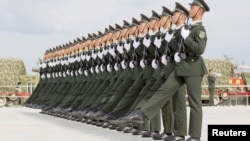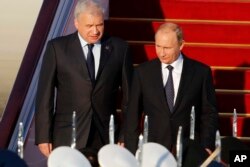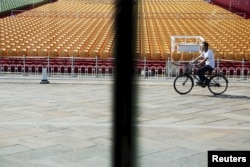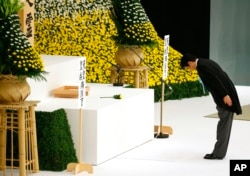China is making final preparations for a high-profile military parade in Beijing to mark the defeat of Japanese forces at the end of World War II.
Heads of state from 30 countries are expected to attend the Thursday parade in Tiananmen Square. The most notable guests include South Korean President Park Geun-hye, Russian President Vladimir Putin, and United Nations Secretary General Ban Ki-moon.
Western leaders largely refused to send high-level delegations to what they see as a show of China's rising military strength and a celebration of the country's ruling Communist Party.
On lockdown
Beijing has made meticulous preparations to ensure the parade goes smoothly. Automobile, subway, and flight traffic has been suspended or limited near Tiananmen Square. Hundreds of factories have also been ordered to suspend or limit operations, in an effort to reduce the city's notoriously choking smog.
Some of the preparations have bordered on the extreme.
Chinese residents living within the parade area have been told to remove scissors and other sharp objects from their homes and offices. They have also been told not to form spontaneous crowds and will even be prevented from opening their windows during the event.
According to state media, authorities have also deployed teams of macaque monkeys to climb up trees and destroy the nests of other birds that officials fear could collide with the fighter jets involved in the parade.
Show of strength
Government-run media have for weeks been hyping up the military parade, which will feature a mass display of 12,000 troops, 500 military vehicles, 200 jet fighters, and various tanks, helicopters and missiles. A government spokesman has said 84 percent of the military equipment on display will be making their public debut.
The parade comes as the U.S. and many of its allies in the region express concern about China's rapidly increasing defense spending, opaque military ambitions, and increasingly bold behavior toward its neighbors in the region, many of whom have territorial disputes with Beijing.
China's relationship with Japan has been especially strained. Those tensions are expected to be on display Thursday during the parade, which celebrates what Beijing calls the Victory of the People's Resistance Against Japanese Aggression and World Anti-Fascist War.
Chinese leaders have repeatedly pushed Japanese officials to offer what they consider to be fresh and sufficient apologies for atrocities committed during Japan's brutal occupation of much of China during the 1930s and 1940s. But Beijing has denied the parade is aimed at sending any message to any particular country.
Japanese Prime Minister Shinzo Abe was invited to attend the event, but turned down the request. Tokyo will instead send one of Abe's predecessors. The U.S., a close ally of Japan, will be represented by Ambassador to China Max Baucus.







